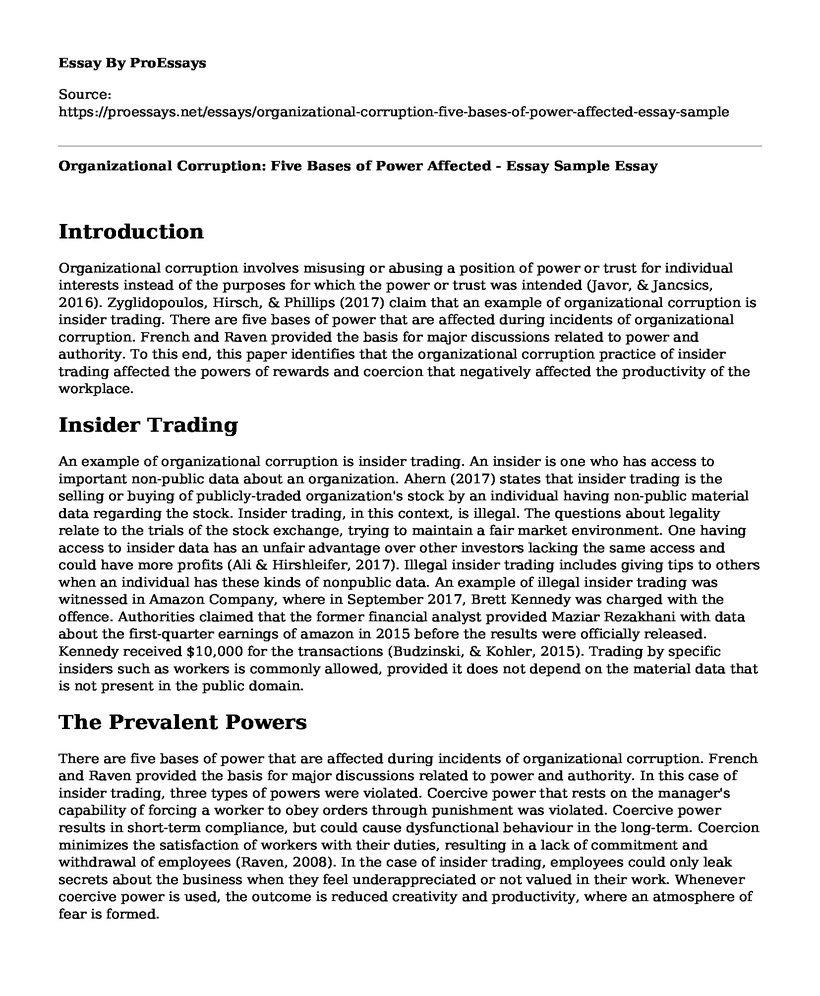Introduction
Organizational corruption involves misusing or abusing a position of power or trust for individual interests instead of the purposes for which the power or trust was intended (Javor, & Jancsics, 2016). Zyglidopoulos, Hirsch, & Phillips (2017) claim that an example of organizational corruption is insider trading. There are five bases of power that are affected during incidents of organizational corruption. French and Raven provided the basis for major discussions related to power and authority. To this end, this paper identifies that the organizational corruption practice of insider trading affected the powers of rewards and coercion that negatively affected the productivity of the workplace.
Insider Trading
An example of organizational corruption is insider trading. An insider is one who has access to important non-public data about an organization. Ahern (2017) states that insider trading is the selling or buying of publicly-traded organization's stock by an individual having non-public material data regarding the stock. Insider trading, in this context, is illegal. The questions about legality relate to the trials of the stock exchange, trying to maintain a fair market environment. One having access to insider data has an unfair advantage over other investors lacking the same access and could have more profits (Ali & Hirshleifer, 2017). Illegal insider trading includes giving tips to others when an individual has these kinds of nonpublic data. An example of illegal insider trading was witnessed in Amazon Company, where in September 2017, Brett Kennedy was charged with the offence. Authorities claimed that the former financial analyst provided Maziar Rezakhani with data about the first-quarter earnings of amazon in 2015 before the results were officially released. Kennedy received $10,000 for the transactions (Budzinski, & Kohler, 2015). Trading by specific insiders such as workers is commonly allowed, provided it does not depend on the material data that is not present in the public domain.
The Prevalent Powers
There are five bases of power that are affected during incidents of organizational corruption. French and Raven provided the basis for major discussions related to power and authority. In this case of insider trading, three types of powers were violated. Coercive power that rests on the manager's capability of forcing a worker to obey orders through punishment was violated. Coercive power results in short-term compliance, but could cause dysfunctional behaviour in the long-term. Coercion minimizes the satisfaction of workers with their duties, resulting in a lack of commitment and withdrawal of employees (Raven, 2008). In the case of insider trading, employees could only leak secrets about the business when they feel underappreciated or not valued in their work. Whenever coercive power is used, the outcome is reduced creativity and productivity, where an atmosphere of fear is formed.
The second power that was prevalent in insider trading as a form of organizational corruption is reward power. As the name suggests, rewards rest on the manager's ability to providing rewards to workers, ranging from improved work schedules to monetary compensation. When rewards are used in flexible ways, it becomes a strong motivator. The case of Amazon where there was insider trading shows that the former financial analyst was not rewarded appropriately, which made a case for engaging in the trade of public information to the lifelong friend (Raven, 2008). The effect of the rewards program is that it diverted the worker's attention from his duties (McQuerrey, 2020). Instead, the employee focused on the rewards that they should be receiving. When these rewards were not present, he began trading personal information of the company.
Conclusion
As identified in this article, organizational corruption affects the work rates of workers and the overall productivity of an organization. A case study of amazon shows the example and effects of insider trading. The main theme is that insider trading as a form of organizational corruption leads to poor decisions in the company that affects the worker-employer relationship.
References
Ahern, K. R. (2017). Information networks: Evidence from illegal insider trading tips. Journal of Financial Economics, 125(1), 26-47. Retrieved from https://msbfile03.usc.edu/digitalmeasures/kahern/intellcont/Ahern%20JFE%202017-1.pdf
Ali, U., & Hirshleifer, D. (2017). Opportunism as a firm and managerial trait: Predicting insider trading profits and misconduct. Journal of Financial Economics, 126(3), 490-515. Retrieved from https://escholarship.org/content/qt2sb6x1hj/qt2sb6x1hj.pdf
Budzinski, O., & Kohler, K. H. (2015). Is Amazon the next Google?. ORDO, 66(1), 263-288. Retrieved from https://www.econstor.eu/bitstream/10419/142322/1/837605962.pdf
Javor, I., & Jancsics, D. (2016). The role of power in organizational corruption: an empirical study. Administration & Society, 48(5), 527-558. Retrieved from https://academicworks.cuny.edu/cgi/viewcontent.cgi?referer=https://scholar.google.com/&httpsredir=1&article=1210&context=gc_pubs
McQuerrey, L. (2020, February 6). How Organizational Power Moves Change Initiative [Web log post]. Small Business - Chron.com. Retrieved from https://smallbusiness.chron.com/organizational-power-moves-change-initiative-36259.html
Raven, B. H. (2008). The bases of power and the power/interaction model of interpersonal influence. Analyses of social issues and public policy, 8(1), 1-22. Retrieved from http://citeseerx.ist.psu.edu/viewdoc/download?doi=10.1.1.652.3115&rep=rep1&type=pdf
Zyglidopoulos, S., Hirsch, P., Martin de Holan, P., & Phillips, N. (2017). Expanding research on corporate corruption, management, and organizations. Retrieved from https://eprints.gla.ac.uk/136876/7/136876.pdf
Cite this page
Organizational Corruption: Five Bases of Power Affected - Essay Sample. (2023, Apr 01). Retrieved from https://proessays.net/essays/organizational-corruption-five-bases-of-power-affected-essay-sample
If you are the original author of this essay and no longer wish to have it published on the ProEssays website, please click below to request its removal:
- Fama and French and Hou, Xue, and Zhang Essay
- Texas Governors Should Appoint State-Level Judges Essay
- Budget Officer Requirements Paper Example
- Annotated Bibliography on Culture Ethnicity and Schooling
- Essay Example on Multicultural Education: Breaking Barriers to Success and Knowledge
- Essay Example on Community Policing: 4 Elements to Empower Communities
- Essay on Public Policy: Crafting Decisions to Serve the Common Good







